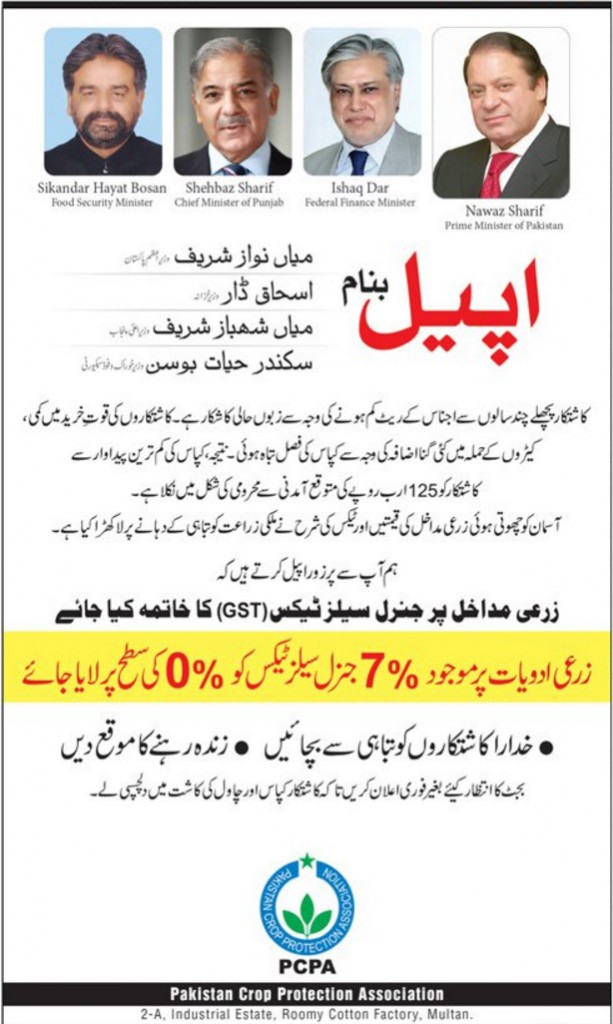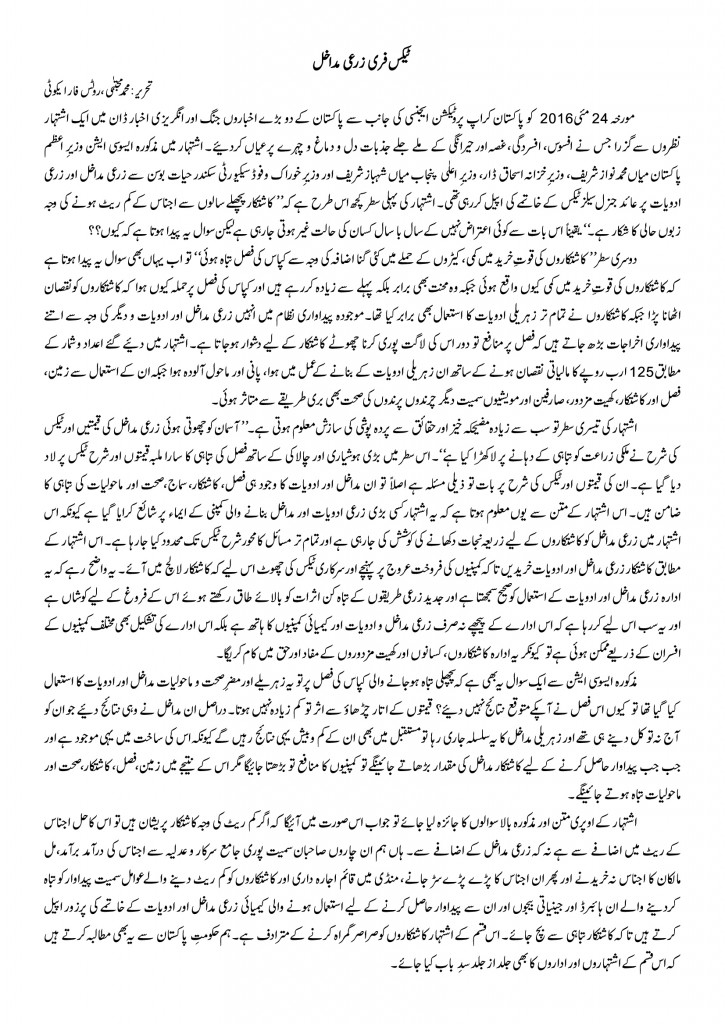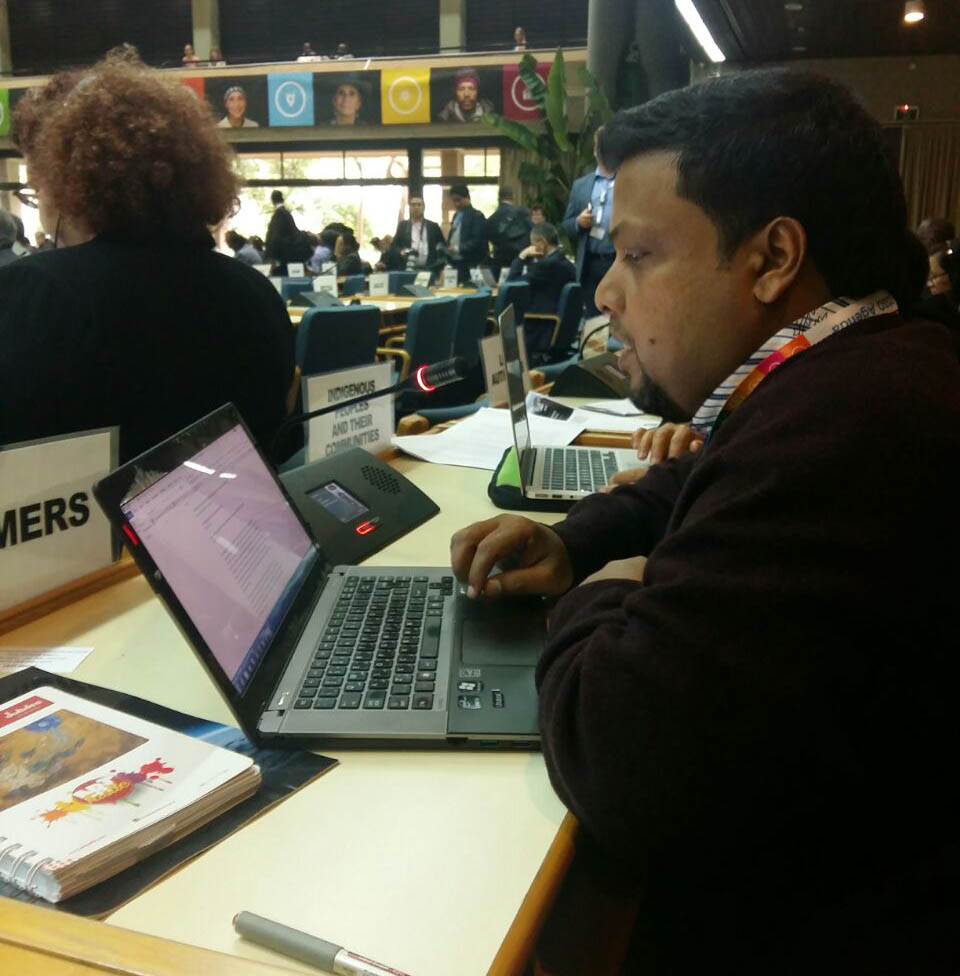Muhammad Mujtaba
May 24, 2016
On 24th May 2016, a glance of an advertisement from Pakistan Crop agency in the two major Newspapers of Pakistan, Dawn and Urdu newspaper Jang pass on from my sight. This leads to the combine impression of regret, sadness, anger and astonishment on my heart and mind. In an advertisement the mentioned association was urging to end general sales tax on the agriculture inputs and agriculture pesticides from Prime Minister Mian Nawaz Sharif, Finance Minister Ishaq Dar, Chief Minister Punjab Shahbaz Sharif and federal Minister for Food Security and Research Sikandar Hayat Khan Boson. The first line of the advertisement shows that “Farmer is in worst condition due to the low rates of commodities” surely there is no doubt in it but question arouses is that Why??
The second line says “the decrease of farmers’ buying power, The cotton crop ruins because of so much increase in the result pesticides’ attack on crop” here, also the question arises that why there is decrease in buying power of farmers and the farmers also faces such loss as they were doing a lot of hard work than before and why pests attack when the pesticides were properly sprayed. In the current productive system the agriculture outputs and, pesticides and other increase the cost of production so much that a small farmer can’t even get his cost of production rather thinking about his profit. According to the statistics given in the advertisement the financial loss of 125 hundred million rupees, and in the production of these poisonous pesticides, water and environment also become polluted including the land, crops, farmers, cultivators, peasants, consumers and livestock even the birds also get effected by it.
The third line was the most humorous and seems to be the conspiracy to hide the facts. “High prices of agriculture inputs and tax rate make the country’s agriculture stand on the edge of destruction.” In this line the depravity of crops is cleverly imposed on prices and tax rate. In fact the price and tax rate are the sub issues, the real problem is the existence of these inputs and pesticides which lead to and are the reason of destruction of crops, farmer, society, health and environment. The text of this advertisement shows that this advertisement is published on behalf of some big agriculture pesticide and inputs companies because according to this add farmer should purchase agriculture inputs and pesticides so that companies would get a lot of profit and the official relief in tax rate is to greed the farmer. It should be clear that this organization have believed on the usage of agriculture output and pesticide on crop and keeping aside the destructive element of modern ways of agriculture. The reason behind all of effort for its accomplishment just because this organization is not only supported by some agriculture input companies and pesticide companies but also formed by the officials of these companies. In the front of these facts then why this organization would work for the benefits and rights of cultivators, farmers and farm labors.
A question also arises for the concerned association that the toxic and hazardous for health and environment inputs were used in previous destructed cotton crops then why these crops did not give those much good expected results? Price fluctuation does not affect more or less effect of pesticides. Indeed, these inputs gave those results which were expected and if these practices in agriculture continues in future the result would be more or less same due to use of these toxic and hazardous inputs because it is in their structure. Whenever, farmers would use these inputs abundantly to increase their production it would ultimately increase the profit of companies but the end result would be destruction of land, crop, farmer, health and environment.
If we closely overview the content of advertisement and above mentioned questions then answer would be the farmers are concerned with high price of production not with the amount of agricultural inputs. We strongly appeal to the government and judiciary that stop the import and export of commodities, mill owner’s refusal to buy these commodity, monopoly in market, destructive hybrid and genetically modified seeds and use of agricultural inputs for increasing production. This kind of advertisements are indeed is like misguiding the farmers. We demand from government of Pakistan to take actions against these types of advertisements and organizations as soon as possible.



